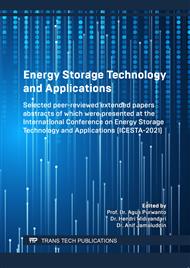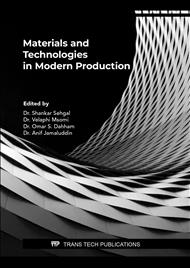[1]
M.H. Eikani, A. Eliassi, N. Khandan, and V.R. Nafisi, Design and fabrication of a 300W PEM fuel cell test station, Procedia Eng. 42 (2012) 368-375. https://doi.org/10.1016/j.proeng. 2012.07.428.
DOI: 10.1016/j.proeng.2012.07.428
Google Scholar
[2]
W.J. Yang, H.Y. Wang, and Y.B. Kim, Channel geometry optimization using a 2D fuel cell model and its verification for a polymer electrolyte membrane fuel cell, 2014, Int. J. Hydrogen Energy. 39 (2014) 9430-9439. https://doi.org/10.1016/j.ijhydene.2014.03.243.
DOI: 10.1016/j.ijhydene.2014.03.243
Google Scholar
[3]
H. Sun, C. Xie, H. Chen, and S. Almheiri, A Numerical study on the effects of temperature and mass transfer in high temperature PEM Fuel Cells with ab-PBI membrane, Appl. Energy. 160 (2015) 937-944. https://doi.org/10.1016/j.apenergy.2015.02.053.
DOI: 10.1016/j.apenergy.2015.02.053
Google Scholar
[4]
B. Najafi, A.H. Mamaghani, F. Rinaldi, and A. Casalegno, Fuel partialization and power or heat shifting strategies applied to a 30 kWel high temperature PEM fuel cell, Int. J. Hydrogen Energy. 40 (2015) 14224-14234. https://doi.org/10.1016/j.ijhydene.2015.08.088.
DOI: 10.1016/j.ijhydene.2015.08.088
Google Scholar
[5]
S.W. Ham, S.Y. Jo, H.W. Dong, and J.W. Jeong, A simplified PEM fuel cell model for building cogeneration applications, Energy and Build. 107 (2015) 213-225. https://doi.org/10.1016/j.enbuild.2015.08.023.
DOI: 10.1016/j.enbuild.2015.08.023
Google Scholar
[6]
S. Authayanun, K.I. Orb, and A. Arpornwichanop, A review of the development of high temperature proton exchange membrane fuel cells, Chinese J. Catal. 36 (2015) 473-483. https://doi.org/10.1016/S1872-2067(14)60272-2.
DOI: 10.1016/s1872-2067(14)60272-2
Google Scholar
[7]
Y. Devrim, H. Devrim, and I. Eroglu, Development of 500 W PEM fuel cell stack for portable power generators, Int. J. Hydrogen Energy. 40 (2015) 7707-7719. https://doi.org/10.1016/S1872-2067(14)60272-2.
DOI: 10.1016/j.ijhydene.2015.02.005
Google Scholar
[8]
Herlambang, Y.D., Roihatin, A., Kurnianingsih, Lee, S.C., and Shyu, J.C., 2019, MEMS-based microfluidic fuel cell for in situ analysis of the cell performance on the electrode surface, 8th Engineering International Conference, Universitas Negeri Semarang, Semarang, Indonesia, Oktober 16. J. Phys.: Conf. Ser. 1444 (2020) 012044. https://doi.org/ 10.1088/1742-6596/1444/1/012044.
DOI: 10.1088/1742-6596/1444/1/012044
Google Scholar
[9]
S. Deng, M.K. Hassan, K.A. Mauritz, and J.W. Mays, Hydrocarbon-based fuel cell membranes: Sulfonated crosslinked poly (1,3-cyclohexadiene) membranes for high temperature polymer electrolyte fuel cells, Polymer, 73 (2015) 17-24. https://doi.org/10.1016/j.polymer.2015.07.030.
DOI: 10.1016/j.polymer.2015.07.030
Google Scholar
[10]
Y.D. Herlambang, Kurnianingsih, A. Roihatin, T. Prasetyo, and F. Arifin, Numerical Analysis of phenomena transport of proton exchange membrane (PEM) fuel cell, J. Adv. Res. Fluid Mech. Therm. Sci., 80 (2021), 127-135. https://doi.org/10.37934/arfmts.80.2.127135.
DOI: 10.37934/arfmts.80.2.127135
Google Scholar
[11]
D. Zhou, F. Gao, F. Al-Durra, A., Breaz, E., Ravey, A., and Miraoui, A., 2018, Development of a multiphysical 2-D model of a PEM fuel cell for real-time control, IEEE Trans. Ind. Appl., 54 (2018) 4864-4874. https://doi.org/ 10.1109/ICSGSC.2018.8541298.
DOI: 10.1109/tia.2018.2839082
Google Scholar
[12]
Y.D. Herlambang, S.C. Lee, S.C., Numerical estimation of photovoltaic-electrolyzer system performance on the basis of a weather database, Int. J. Green Energy., 14 (2017), 575-586. https://doi.org/10.1080/15435075.2017.1307200.
DOI: 10.1080/15435075.2017.1307200
Google Scholar
[13]
I. Khazaee, and A. Rava, A., Numerical simulation of the performance of solid oxide fuel cell with different flow channel geometries, Energy, 119 (2017) 235-244. https://doi.org/10.1016/j.energy.2016.12.074.
DOI: 10.1016/j.energy.2016.12.074
Google Scholar
[14]
Y.D. Herlambang, J.C. Shyu, and S.C. Lee, S.C., 2017, Numerical simulation of the performance of air-breathing direct formic acid microfluidic fuel cells, Micro Nano Lett., 12 (2017) 860-865. https://doi.org/ 10.1049/mnl.2017.0322.
DOI: 10.1049/mnl.2017.0322
Google Scholar
[15]
S. Thomas, S.S. Araya, Frensch, S.H, Steenberg, T., and Kaer, S.K., Hydrogen mass transport resistance changes in a high temperature polymer membrane fuel cell as a function of current density and acid doping, Electrochim. Acta, 317 (2019), 521-527. https://doi.org/10.1016/j.electacta.2019.06.021.
DOI: 10.1016/j.electacta.2019.06.021
Google Scholar
[16]
L. Rostami, P.M.G. Nejad, and A. Vatani. A numerical investigation of serpentine flow channel with different bend sizes in polymer electrolyte membrane fuel cells, Energy., 97 (2016) 400-410. https://doi.org/10.1016/j.energy.2015.10.132.
DOI: 10.1016/j.energy.2015.10.132
Google Scholar
[17]
R.K.A. Rasheed, Q. Liao, Z. Caizhi, and S.H. Chan, A review on modelling of high temperature proton exchange membrane fuel cells (HT-PEMFCs), Int. J. Hydrogen Energy., 42 (2017) 3142-3165. https://doi.org/10.1016/j.ijhydene.2016.10.078.
DOI: 10.1016/j.ijhydene.2016.10.078
Google Scholar
[18]
S. Rezazadeh, R. Mirzaei, H. Sadeghi, and I. Mirzaei, 2018, Investigation of Flow Channel Geometrical Configuration Design Effect on a Proton Exchange Membrane Fuel Cell Performance and Mass Transport Phenomenon, 2nd International Conference on Smart Grid and Smart Cities (ICSGSC), Kuala Lumpur City, August 12-14, IEEE (Institue of Electrical and Electronic Engineering), 137-141 https://doi.org/10.1109/ICSGSC.2018.8541298.
DOI: 10.1109/icsgsc.2018.8541298
Google Scholar
[19]
Y.D. Herlambang, A. Roihatin, K. Kurnianingsih, T. Prasetyo, S.C. Lee, and J.C. Shyu, 2019, Computation and numerical modeling of fuel concentration distribution and current density on performance of the microfluidic fuel cell, 2nd International Conference on Chemical Processes and Product Engineering (ICCPPE), Patra Jasa Hotel, Semarang City, September 26. AIP Conf. Proc. 2197 (2020) 25-26. https://doi.org/10.1063/1.5140949.
DOI: 10.1063/1.5140949
Google Scholar
[20]
K. Nikiforow, P. Koski, and J. Ihonen, Discrete ejector control solution design, characterization, and verification in a 5 kW PEMFC system, Int. J. Hydrogen Energy. 42 (2017) 16760-16772. https://doi.org/10.1016/j.ijhydene.2017.05.151.
DOI: 10.1016/j.ijhydene.2017.05.151
Google Scholar
[21]
W. Li, Q. Zhang, C. Wang, X. Yan, S. Shen, G. Xia, and Zhang, J., Experimental and numerical analysis of a three-dimensional flow field for PEMFCs, Energy. 195 (2017) 278-288. https://doi.org/10.1016/j.apenergy.2017.03.008.
DOI: 10.1016/j.apenergy.2017.03.008
Google Scholar
[22]
D.R. Dekel, Review of cell performance in anion exchange membrane fuel cells, J. Power Sources., 375 (2018) 158-169. https://doi.org/10.1016/j.jpowsour.2017.07.117.
DOI: 10.1016/j.jpowsour.2017.07.117
Google Scholar
[23]
M. Saufi Sulaiman, B. Singh, and W.A.N.W. Mohamed, Experimental and theoretical study of thermoelectric generator waste heat recovery model for an ultra-low temperature PEM fuel cell powered vehicle, Energy. 179 (2019) 628-646. https://doi.org/10.1016/j.energy.2019.05.022.
DOI: 10.1016/j.energy.2019.05.022
Google Scholar
[24]
L.A. Briceno-Mena, G. Venugopalan, J.A. Romagnoli, and C.G. Arges, Machine learning for guiding high-temperature PEM fuel cells with greater power density, Patterns. 2 (2021) 100187. https://doi.org/10.10.1016/j.patter.2020.100187.
DOI: 10.1016/j.patter.2020.100187
Google Scholar
[25]
M.F. Chinannai, J. Lee, and H. Ju, Study of the characteristics of temperature rise and coolant flow rate control during malfunction of PEM fuel cells, Int. J. Hydrogen Energy. xxx (2021) xxx. https://doi.org/10.1016/j.ijhydene.2020.04.221.
DOI: 10.1016/j.ijhydene.2020.04.221
Google Scholar
[26]
Herlambang, Y.D., Kurnianingsih, K., Roihatin, A., Arifin, F., 2020, Model experiment of photovoltaic-electrolyzer fuel cell as a small-scale power, 3rd International Conference on Vocational of Mechanical and Automotive Technology (ICoVEMAT 2020), Universitas Negeri Yogyakarta, Indonesia, Oktober 5. J. Phys.: Conf. Ser. 1700 (2020) 012100. https://doi.org/10.1088/1742-6596/1700/1/012100.
DOI: 10.1088/1742-6596/1700/1/012100
Google Scholar
[27]
R.E. Yonoff, D.M. Cambronel, S. Carry, A.R. Montenegro, and I. Portnoy, Performance assessment and economic perspectives of integrated PEM fuel cell and PEM electrolyzer for electric power generation, Heliyon. 7 (2021) e06506. https://doi.org/10.10.1016/j.heliyon.2021.e06506.
DOI: 10.1016/j.heliyon.2021.e06506
Google Scholar
[28]
I. Fakhari, A. Behzadi, E. Gholamian, P. Ahmadi, and A. Arabkoohsar, Comparative double and integer optimization of low-grade heat recovery from PEM fuel cells employing an organic Rankine cycle with zeotropic mixtures, Energ. Convers. Manag. 228 (2021) 113695. https://doi.org/10.1016/j.enconman.2020.113695.
DOI: 10.1016/j.enconman.2020.113695
Google Scholar
[29]
S.I. Kim, K.Y. Baik, B.J. Kim, N.W. Lee and M.S. Kim, Experimental study on mitigating the cathode flooding at low temperature by adding hydrogen to cathode reactant gas in PEM fuel cell, Int. J. Hydrogen Energy. 37 (2012) 1-9. https://doi.org/10.1016/j.ijhydene.2012.11.054.
DOI: 10.1016/j.ijhydene.2012.11.054
Google Scholar
[30]
G. Kolb, S. Keller, S. Neuberg, J. Schurer, D. Tiemann, H. Valenteijn, M. Wichert, and R. Zapf, A complete fuel processor for propylene glycol as hydrogen supply for a 5 kW low temperature PEM fuel cell – Interim report on single reactors and system performance, Catal. Today. xx (2021) 1-10. https://doi.org/10.1016/j.cattod.2021.02.009.
DOI: 10.1016/j.cattod.2021.02.009
Google Scholar
[31]
E. Martino, A. Gusev, A. Katsaounis, and C.G. Vayenas, Steady state multiplicities in low temperature PEM fuel cells, Mater. Today Proc. 5 (2018) 27397-27405. https://doi.org/10.1016/j.matpr.2018.09.057.
DOI: 10.1016/j.matpr.2018.09.057
Google Scholar
[32]
I.K. Muritala, D. Guban, M. Roeb, and C. Sattler, High temperature production of hydrogen: assessment of non-renewable resources technologies and emerging trends, Int. J. Hydrogen Energy. xxx (2021) xxx. https://doi.org/10.1016/j.ijhydene.2019.08.154.
DOI: 10.1016/j.ijhydene.2019.08.154
Google Scholar
[33]
S. Raman, K.B. Iyeswaria, S. Narasimhan, and R. Rengaswamy, Effects of water induced pore blockage and mitigation strategies in low temperature PEM fuel cells – A simulation study, Int. J. Hydrogen Energy. 42 (2017) 1-15. https://doi.org/10.1016/j.ijhydene.2017.03.174.
DOI: 10.1016/j.ijhydene.2017.03.174
Google Scholar
[34]
T. Ruiu, A.M. Dreizier, J. mitzel, and E. Gulzow, Evaluation of a 2,5 kWel automotive low temperature PEM fuel cell stack with extended operating temperature range up to 120 0C, J. Power Sources. 303 (2016) 257-266. https://doi.org/10.1016/j.jpowsour.2015.10.056.
DOI: 10.1016/j.jpowsour.2015.10.056
Google Scholar
[35]
M. Dhimish, R.G. Vieira, and G. Badran, Investigating the stability and degradation of hydrogen PEM fuel cell, Int. J. Hydrogen Energy. xxx (2021) xxx. https://doi.org/10.1016/j.ijhydene.2021.08.183.
DOI: 10.1016/j.ijhydene.2021.08.183
Google Scholar
[36]
M. Arif, C.P. S.C.P. Cheung, and J. Andrews, Numerical investigation of effects of different flow channel configurations on the 100 cm2 PEM fuel cell performance under different operating conditions, Catal. Today. xxx (2021) xxx. https://doi.org/10.1016/j.cattod.2021.07.016.
DOI: 10.1016/j.cattod.2021.07.016
Google Scholar
[37]
K. Sankar, and A.K. Jana, Nonlinear control of a PEM fuel cell integrated system with water electrolyzer, Chem. Eng. Res. Des. 171 (2021) 150-167. https://doi.org/10.1016/j.cherd.2021.05.014.
DOI: 10.1016/j.cherd.2021.05.014
Google Scholar
[38]
T. Taner, The novel and innovative design with using HYDROGEN fuel of PEM fuel cell: Efficiency of thermodynamic analyze, Fuel. 302 (2021) 121109. https://doi.org/10.1016/j.fuel.2021.121109.
DOI: 10.1016/j.fuel.2021.121109
Google Scholar
[39]
Herlambang, Y.D., Prasetyo, T., Roihatin, A., Safarudin, Y.M., Arifin, F., 2021, Hybrid power plant of the photovoltaic-fuel cell, International Conference on Innovation in Science and Technology (ICIST 2019), Politeknik Negeri Semarang, December 16. IOP Conf. Ser.: Mater. Sci. Eng. 1108 (2021) 012049. https://doi.org/10.1088/1757-899X/1108/1/012049.
DOI: 10.1088/1757-899x/1108/1/012049
Google Scholar



